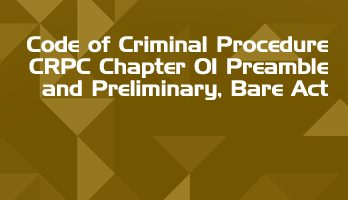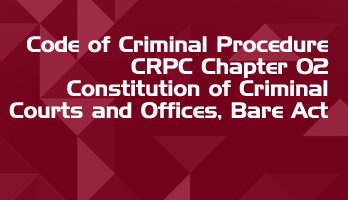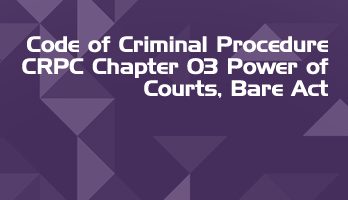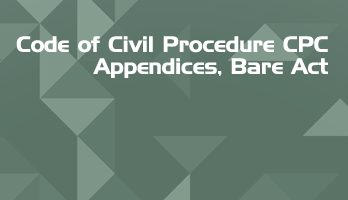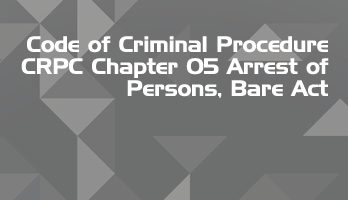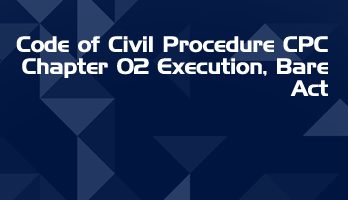A 'Bare act' is the actual legislation passed by the Parliament of India. Generally, an act sets out the high level legal and policy principles applicable to the subject matter of the law.
Most acts are accompanied by 'subsidiary legislation' such as rules, regulations, notifications and orders; which address the actual implementation detail of the act.
Free Full Course Available on LawMint's YouTube Channel
How to Land Your Dream LLB Internship in a Top Law Firm
- Part 1 - Introduction
- Part 2 - Internship Planning
- Part 3 - Internship Research
- Part 4 - Building Your Profile
- Part 5 - The Email
- Part 6 - The Resume
- Part 7 - The Cover Letter
- Part 8 - The Interview
- Part 9 - Self Development
Practical and comprehensive course, with real examples and step-by-step analysis of the complete internship application process. Check out LawMint's YouTube channel now!
Indian Penal Code, 1860
Chapter III – Of Punishments
Section 53 – Punishments
The punishments to which offenders are liable under the provisions of this Code are:
- Death;
- Imprisonment for life;
- ***
- Imprisonment, which is of two descriptions, namely:
- Rigorous, that is, with hard labour;
- Simple;
- Forfeiture of property;
- Fine.
Section 53A – Construction of reference to transportation
- Subject to the provisions of sub – section (2) and sub – section (3), any reference to – transportation for life – in any other law for the time being in force or in any instrument or order having effect by virtue of any such law or of any enactment repealed shall be construed as a reference to – imprisonment for life – .
- In every case in which a sentence of transportation for a term has been passed before the commencement of the Code of Criminal Procedure (Amendment) Act, 1955 (26 of 1955), the offender shall be dealt with in the same manner as if sentenced to rigorous imprisonment for the same term.
- Any reference to transportation for a term or to transportation for any shorter term (by whatever name called) in any other law for the time being in force shall be deemed to have been omitted.
- Any reference to – transportation – in any other law for the time being in force shall, –
- if the expression means transportation for life, be construed as a reference to imprisonment for life;
- if the expression means transportation for any shorter term, be deemed to have been omitted.
Section 54 – Commutation of sentence of death
In every case in which sentence of death shall have been passed, the appropriate Government may, without the consent of the offender, commute the punishment for any other punishment provided by this Code.
Section 55 – Commutation of sentence of imprisonment for life
In every case in which sentence of imprisonment for life shall have been passed, the appropriate Government may, without the consent of the offender, commute the punishment for imprisonment of either description for a term not exceeding fourteen years.
Section 55A – Definition of – appropriate Government –
In sections 54 and 55 the expression – appropriate Government – means, –
- in cases where the sentence is a sentence of death or is for an offence against any law relating to a matter to which the executive power of the Union extends, the Central Government; and
- in cases where the sentence (whether of death or not) is for an offence against any law relating to a matter to which the executive power of the State extends, the Government of the State within which the offender is sentenced.
Section 56 – (Repealed) Sentence of Europeans and Americans to penal servitude
Proviso as to sentence for term exceeding ten years but not for life – Rep. by the Criminal Law (Removal of Racial Discriminations) Act, 1949
Section 57 – Fractions of terms of punishment
In calculating fractions of terms of punishment, imprisonment for life shall be reckoned as equivalent to imprisonment for twenty years.
Section 58 – (Repealed) Offenders sentenced to transportation how dealt with until transported
Rep. by the Code of Criminal Procedure (Amendment) Act, 1955 (26 of 1955)
Section 59 – (Repealed) Transportation instead of imprisonment
Rep. by the Code of Criminal Procedure (Amendment) Act, 1955 (26 of 1955)
Section 60 – Sentence may be (in certain cases of imprisonment) wholly or partly rigorous or simple
In every ease in which an offender is punishable with imprisonment which may be of either description, it shall be competent to the Court which sentences such offender to direct in the sentence that such imprisonment shall be wholly rigorous, or that such imprisonment shall be wholly simple, or that any part of such imprisonment shall be rigorous and the rest simple.
Section 61 – (Repealed) Sentence of forfeiture of property
Rep. by the Indian Penal Code (Amendment) Act. 1921 (16 of 1921)
Section 62 – (Repealed) Forfeiture of property in respect of offenders punishable with death, transportation or imprisonment
Rep. by the Indian Penal Code (Amendment) Act. 1921 (16 of 1921) section 4.
Section 63 – Amount of fine
Where no sum is expressed to which a fine may extend, the amount of fine to which the offender is liable is unlimited, but shall not be excessive.
Section 64 – Sentence of imprisonment for non – payment of fine
In every case, of an offence punishable with imprisonment as well as fine, in which the offender is sentenced to a fine, whether with or without imprisonment, and in every case of an offence punishable with imprisonment or fine, or with fine only, in which the offender is sentenced to a fine, it shall be competent to the Court which sentences such offender to direct by the sentence that, in default of payment of the fine, the offender shall suffer imprisonment for a certain term, in which imprisonment shall be in excess of any other imprisonment to which he may have been sentenced or to which he may be liable under a commutation of a sentence.
Section 65 – Limit to imprisonment for non – payment of fine, when imprisonment and fine awardable
The term for which the court directs the offender to be imprisoned in default of payment of a fine shall not exceed one – fourth of the term of imprisonment which is the maximum fixed for the offence, if the offence be punishable with imprisonment as well as fine.
Section 66 – Description of imprisonment for non – payment of fine
The imprisonment which the Court imposes in default of payment of a fine may be of any description to which the offender might have been sentenced for the offence.
Section 67 – Imprisonment for non – payment of fine, when offence punishable with fine only
If the offence be punishable with fine only, the imprisonment which the Court imposes in default of payment of the fine shall be simple, and the term for which the Court directs the offender to be imprisoned, in default of payment of fine, shall not exceed the following scale, that is to say, for any term not exceeding two months when the amount of the fine shall not exceed fifty rupees, and for any term not exceeding four months when the amount shall not exceed one hundred rupees, and for any term not exceeding six months in any other case.
Section 68 – Imprisonment to terminate on payment of fine
The imprisonment which is imposed in default of payment of a fine shall terminate whenever that fine is either paid or levied by process of law.
Section 69 – Termination of imprisonment on payment of proportional part of fine
If, before the expiration of the term of imprisonment fixed in default of payment, such a proportion of the fine be paid or levied that the term of imprisonment suffered in default of payment is not less than proportional to the part of the fine still unpaid, the imprisonment shall terminate.
Illustrations
- A is sentenced to a fine of one hundred rupees and to four months – imprisonment in default of payment. Here, if seventy – five rupees of the fine be paid or levied before the expiration of one month of the imprisonment, A will be discharged as soon as the first month has expired. If seventy – five rupees be paid or levied at the time of the expiration of the first month, or at any later time while A continues in imprisonment, A will be immediately discharged. If fifty rupees of the fine be paid or levied before the expiration of two months of the imprisonment, A will be discharged as soon as the two months are completed. If fifty rupees be paid or levied at the time of the expiration of those two months, or at any later time while A continues in imprisonment, A will be immediately discharged.
Section 70 – Fine leviable within six years, or during imprisonment – Death not to discharge property from liability
The fine, or any part thereof which remains unpaid, may be levied at any time within six years after me passing of the sentence, and if, under the sentence, the offender be liable to imprisonment for a longer period than six years, then at any time previous to the expiration of that period; and the death of the offender does not discharge from the liability any property which would, after his death, be legally liable for his debts.
Section 71 – Limit of punishment of offence made up of several offences
Where anything which is an offence is made up of parts, any of which parts is itself an offence, the offender shall not be punished with the punishment of more than one of such his offences, unless it be so expressly provided.
Where anything is an offence falling within two or more separate definitions of any law in force for the time being by which offences are defined or punished, or
where several acts, of which one or more than one would by itself or themselves constitute an offence, constitute, when combined, a different offence,
the offender shall not be punished with a more severe punishment than the Court which tries him could award for any one of such offences.
Illustrations
- A gives Z fifty strokes with a stick. Here A may have committed the offence of voluntarily causing hurt to Z by the whole beating, and also by each of the blows which make up the whole beating. If A were liable to punishment for every blow, he might be imprisoned for fifty years, one for each blow. But he is liable only to one punishment for the whole beating.
- But if, while A is beating Z, Y interferes, and A intentionally strikes Y, here, as the blow given to Y is no part of the act whereby A voluntarily causes hurt to Z, A is liable to one punishment for voluntarily causing hurt to Z, and to another for the blow given to Y.
Section 72 – Punishment of person guilty of one of several offences, the judgment stating that it is doubtful of which
In all cases in which judgment is given that a person is guilty of one of several offences specified in the judgment, but that it is doubtful of which of these offences, he is guilty, the offender shall be punished for the offence for which the lowest punishment is provided if the same punishment is not provided for all.
Section 73 – Solitary confinement
Whenever any person is convicted of an offence for which under this Code the Court has power to sentence him to rigorous imprisonment, the Court may, by its sentence, order that the offender shall be kept in solitary confinement for any portion or portions of the imprisonment to which he is sentenced, not exceeding three months in the whole, according to the following scale, that is to say –
- a time not exceeding one month if the term of imprisonment shall not exceed six months;
- a time not exceeding two months if the term of imprisonment shall exceed six months and shall not exceed one year;
- a time not exceeding three months if the term of imprisonment shall exceed one year.
Section 74 – Limit of solitary confinement
In executing a sentence of solitary confinement, such confinement shall in no case exceed fourteen days at a time, with intervals between the periods of solitary confinement of not less duration than such periods; and when the imprisonment awarded shall exceed three months, the solitary confinement shall not exceed seven days in any one month of the whole imprisonment awarded, with intervals between the periods of solitary confinement of not less duration than such periods.
Section 75 – Enhanced punishment for certain offences under Chapter XII or Chapter XVII after previous conviction
Whoever, having been convicted, –
- by a court in India, of an offence punishable under Chapter XII or Chapter XVII of this Code with imprisonment of either description for a term of three years or upwards, shall be guilty of any offence punishable under either of those Chapters with like imprisonment for the like term, shall be subject for every such subsequent offence to imprisonment for life, or to imprisonment of either description for a term which may extend to ten years.
Important Central Acts in Regional Languages
Legislative department website also features regional language versions of several important Central Acts.
Free Full Course Available on LawMint's YouTube Channel
How to Land Your Dream LLB Internship in a Top Law Firm
- Part 1 - Introduction
- Part 2 - Internship Planning
- Part 3 - Internship Research
- Part 4 - Building Your Profile
- Part 5 - The Email
- Part 6 - The Resume
- Part 7 - The Cover Letter
- Part 8 - The Interview
- Part 9 - Self Development
Practical and comprehensive course, with real examples and step-by-step analysis of the complete internship application process. Check out LawMint's YouTube channel now!







